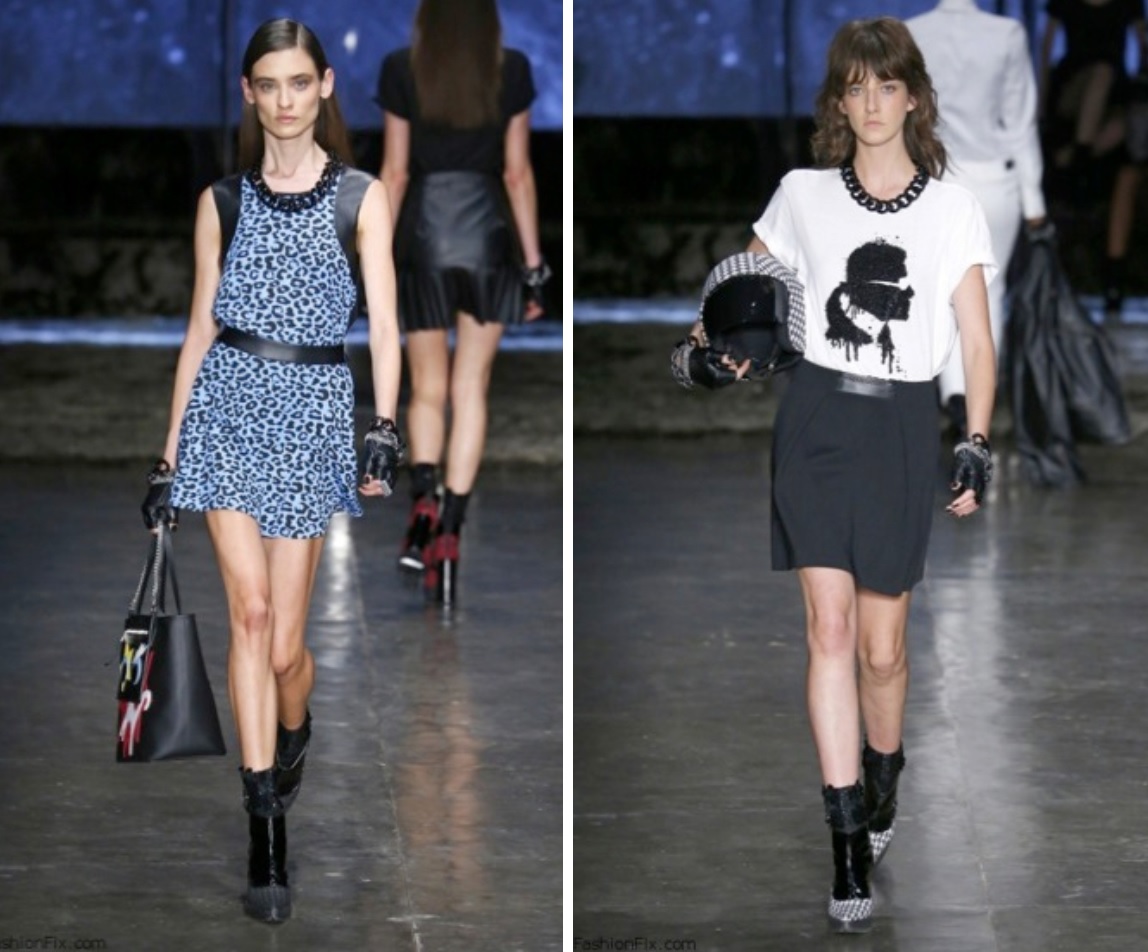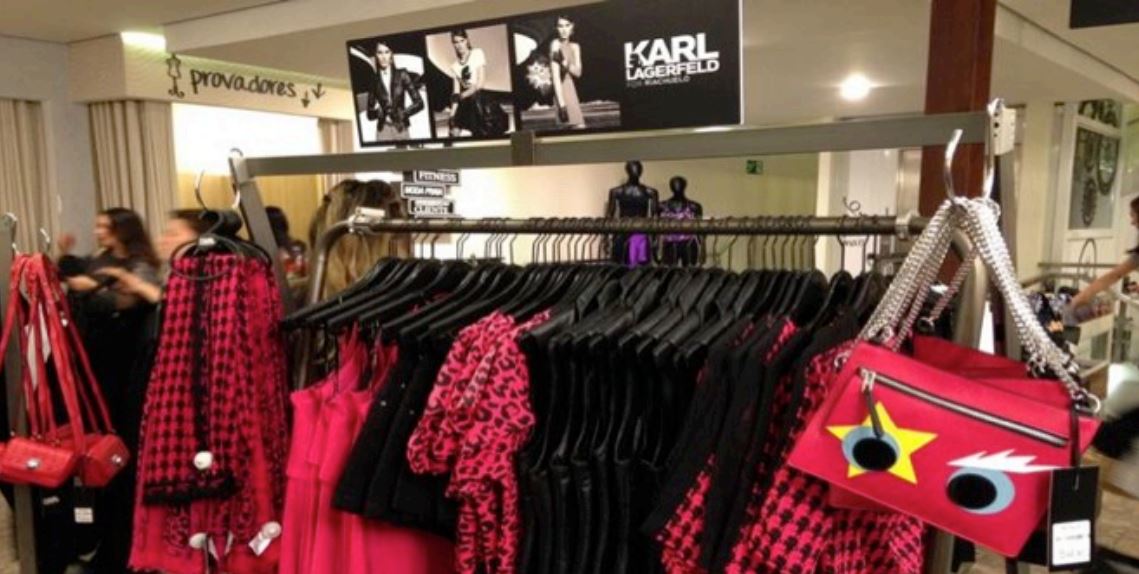The Fast Fashion-Luxury Collaboration Continues In Latin America
The second day of Brazil’s 41
st annual São Paulo Fashion Week finished with a presentation of Karl Lagerfeld’s new fast-fashion capsule collection for Riachuelo. Owned by Guararapes, the largest fashion group in Brazil, Riachuelo has a total of 289 stores nationwide; the most recent opening was in Nova Iguaçú, just two days after the launch of Lagerfeld’s new collection.

The collection is marked by its use of leather, animal print and tweed, and by its T-shirts emblazoned with “KARL” and the designer’s profile, giving the line a mature rock feel. After the Fashion Week presentation, racks carrying the previously displayed pieces were wheeled onstage, and the 35 runway looks were all offered for sale immediately after the show. The 75 items in the collection range in price from R$39.90 (US$11) to R$399.90 (US$113), and they premiered in stores the day after the runway show.
Karl Lagerfeld pioneered the luxury-fast fashion collaboration 12 years ago, when he designed a collection for H&M. Since then, H&M has continued the trend, collaborating with Alexander Wang, Olivier Rousteing for Balmain, and Versace, among many others. The collaborations have proved hugely successful for H&M, with many collections having sold out the same day they premiered in stores.
As Latin American consumers become increasingly familiar with brands that offer luxury at a more affordable price, the opportunity for luxury designers and fast-fashion companies will grow across the region, reflecting the trends we have already seen in Europe and the US.
It was reported that first-day sales of Karl Lagerfeld’s collection for Riachuelo surpassed those of the store’s 2014 collaboration with Versace. The Karl Lagerfeld brand stated that the collaboration would help the brand enter the Latin American market in a safe and measured way.
The company intends to open 10 stores in the Middle East, Asia and Europe in 2016. And CEO Pier Paolo Righi said it is only a matter of time before Karl Lagerfeld opens a brick-and-mortar location in Brazil, although he acknowledged the challenges of entering the market. Righi noted that, in order to operate successfully in the country, it is important to manufacture locally, due to high import taxes, and to have strong local partnerships. By entering Brazil via Riachuelo, the Karl Lagerfeld brand looks to take full advantage of the chain’s well-established market position in the country.


 The collection is marked by its use of leather, animal print and tweed, and by its T-shirts emblazoned with “KARL” and the designer’s profile, giving the line a mature rock feel. After the Fashion Week presentation, racks carrying the previously displayed pieces were wheeled onstage, and the 35 runway looks were all offered for sale immediately after the show. The 75 items in the collection range in price from R$39.90 (US$11) to R$399.90 (US$113), and they premiered in stores the day after the runway show.
Karl Lagerfeld pioneered the luxury-fast fashion collaboration 12 years ago, when he designed a collection for H&M. Since then, H&M has continued the trend, collaborating with Alexander Wang, Olivier Rousteing for Balmain, and Versace, among many others. The collaborations have proved hugely successful for H&M, with many collections having sold out the same day they premiered in stores.
As Latin American consumers become increasingly familiar with brands that offer luxury at a more affordable price, the opportunity for luxury designers and fast-fashion companies will grow across the region, reflecting the trends we have already seen in Europe and the US.
It was reported that first-day sales of Karl Lagerfeld’s collection for Riachuelo surpassed those of the store’s 2014 collaboration with Versace. The Karl Lagerfeld brand stated that the collaboration would help the brand enter the Latin American market in a safe and measured way.
The company intends to open 10 stores in the Middle East, Asia and Europe in 2016. And CEO Pier Paolo Righi said it is only a matter of time before Karl Lagerfeld opens a brick-and-mortar location in Brazil, although he acknowledged the challenges of entering the market. Righi noted that, in order to operate successfully in the country, it is important to manufacture locally, due to high import taxes, and to have strong local partnerships. By entering Brazil via Riachuelo, the Karl Lagerfeld brand looks to take full advantage of the chain’s well-established market position in the country.
The collection is marked by its use of leather, animal print and tweed, and by its T-shirts emblazoned with “KARL” and the designer’s profile, giving the line a mature rock feel. After the Fashion Week presentation, racks carrying the previously displayed pieces were wheeled onstage, and the 35 runway looks were all offered for sale immediately after the show. The 75 items in the collection range in price from R$39.90 (US$11) to R$399.90 (US$113), and they premiered in stores the day after the runway show.
Karl Lagerfeld pioneered the luxury-fast fashion collaboration 12 years ago, when he designed a collection for H&M. Since then, H&M has continued the trend, collaborating with Alexander Wang, Olivier Rousteing for Balmain, and Versace, among many others. The collaborations have proved hugely successful for H&M, with many collections having sold out the same day they premiered in stores.
As Latin American consumers become increasingly familiar with brands that offer luxury at a more affordable price, the opportunity for luxury designers and fast-fashion companies will grow across the region, reflecting the trends we have already seen in Europe and the US.
It was reported that first-day sales of Karl Lagerfeld’s collection for Riachuelo surpassed those of the store’s 2014 collaboration with Versace. The Karl Lagerfeld brand stated that the collaboration would help the brand enter the Latin American market in a safe and measured way.
The company intends to open 10 stores in the Middle East, Asia and Europe in 2016. And CEO Pier Paolo Righi said it is only a matter of time before Karl Lagerfeld opens a brick-and-mortar location in Brazil, although he acknowledged the challenges of entering the market. Righi noted that, in order to operate successfully in the country, it is important to manufacture locally, due to high import taxes, and to have strong local partnerships. By entering Brazil via Riachuelo, the Karl Lagerfeld brand looks to take full advantage of the chain’s well-established market position in the country.
